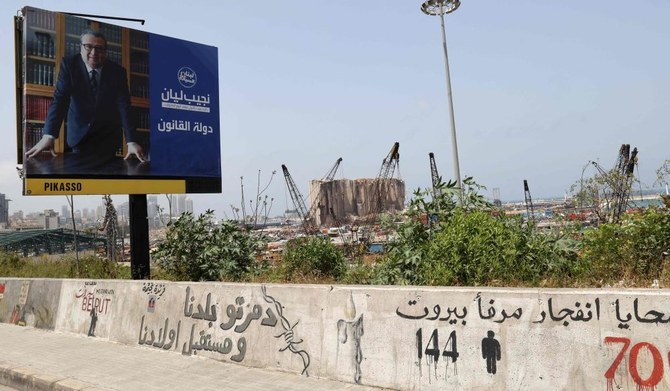BEIRUT: Lebanese expats voting on Friday will inaugurate the first phase of this month’s parliamentary elections.
Expats will vote in 59 countries, but just 10 nations will commence the first phase of voting on Friday. The expats in these countries, which include Saudi Arabia, Qatar, Kuwait, Syria and Iraq, have a Friday weekend.
The second phase of voting takes place on May 8 in countries that have a Sunday weekend.
The elections in Lebanon will take place on May 15 with candidates competing in 15 districts in all of the governorates and districts to select new representatives for 128 parliamentary seats.
The term of the current parliament, elected four years ago, will end on May 21.
The code of conduct for candidates and media outlets comes into force 24 hours before the vote.
All means of invitation, intimidation and sectarian polarization have been used by the ruling parties to ensure their continuation in parliament, defeating tireless attempts by the opposition to turn the tables.
Regions with Christian influence top the list of candidates, with 269 registered in Mount Lebanon and 292 in the north.
The south, a region with a Shiite majority, has the lowest rate of candidacy, with just 105 standing, while Beirut registered 174 and the Bekaa region 203.
Nadim Abdelmalak, president of Lebanon’s supervisory commission for elections, criticized “the chaotic opinion polls that claim the victory of one candidate and the failure of another, despite the warnings sent by the commission to those concerned. The election requires every opinion poll prepared for the announcement to be provided to the commission.”
Abdelmalak criticized “the magnitude of hate speech and treason, given that the electoral law requires that such rhetoric be mitigated, steering away from abasement, revilement, incitement to sectarian conflict and sometimes terrorism, perhaps used to reinforce sectarianism.”
The Lebanese Association for Democratic Elections said that money has been spent to buy loyalties to secure victory, in addition to providing aid, promises and electoral bribes.
The association added that violence, pressure tactics, influence, public resources, racist and sectarian rhetoric, libel and defamation had all been used by some candidates seeking an electoral advantage.
Intimidation began in the Sarafand region of southern Lebanon to prevent opponents of Shiite groups Hezbollah and the Amal Movement from announcing their candidacy.
Intimidation was also exercised in the northern Bekaa region by the same duo against other Shiite candidates, including Sheikh Abbas Al-Jawhari. Gunshots and rockets were fired in an electoral meeting he held.
Candidate Hassan Raad was beaten at a religious gathering in Baalbek. The Amal Movement and Hezbollah have previously pushed some families to disown female candidates participating in competing lists.
As a result, three Shiite candidates — Ramez Amhaz, Hayman Mchayek and Rifaat Al-Masri — withdrew from the election.
Intimidation also took place in the northern region of Jbeil. An unidentified drone was seen hovering over the district of candidate Faris Saeed, who opposes Hezbollah and the Iranian influences in Lebanese politics. A car was also spotted around his house in Qartaba allegedly monitoring his activities.
The inciteful atmosphere reached the highest level when Sheikh Nazir Jishi called for the election of Hezbollah’s candidates and attacked the Lebanese Forces Party, using derogatory terms against women in predominantly Christian tourist areas, to the extent that he was renounced by Hezbollah and the Supreme Islamic Shiite Council.
The visits of Gebran Bassil, president of the Free Patriotic Movement, to some regions have been met with popular denunciations against the backdrop of Bassil’s alliance with Hezbollah. During his visit to the northern Lebanese region of Akkar, Bassil’s convoy was blocked, and images and signs of the party were burned, escalating into a violent clash.
Sunni voters are divided into two categories. The first, with the majority being loyal supporters of Saad Hariri’s Future Movement, will abstain from voting, whereas the second group says there is a chance for change, noting that the Sunni scene controls more than half of the electoral districts in Lebanon.
Hassan Nasrallah, chief of Hezbollah, described the vote as “the most important political battle in Lebanon.” In March, he stressed that “it’s important for all Hezbollah’s MPs to win and that we should work toward obtaining the majority.”
















